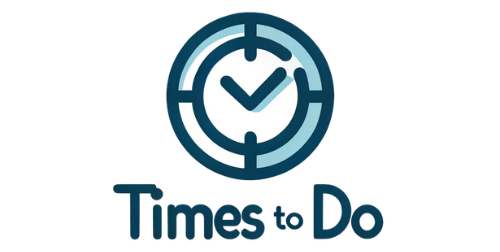The Best Time of Day to take Creatine in 2024

Creatine is one of the most popular and effective supplements used by athletes and fitness enthusiasts to enhance performance and muscle growth. However, the timing of creatine intake can significantly impact its benefits. This comprehensive guide will explore the science behind optimizing your creatine supplementation schedule.
What is Creatine and How Does it Work?
Creatine is a naturally occurring compound found in foods like meat and fish. It is also produced in small amounts by the liver, pancreas, and kidneys. The primary role of creatine is to supply energy to cells in the body. It acts as a rapid energy source for muscle contraction and other fast-moving activities.
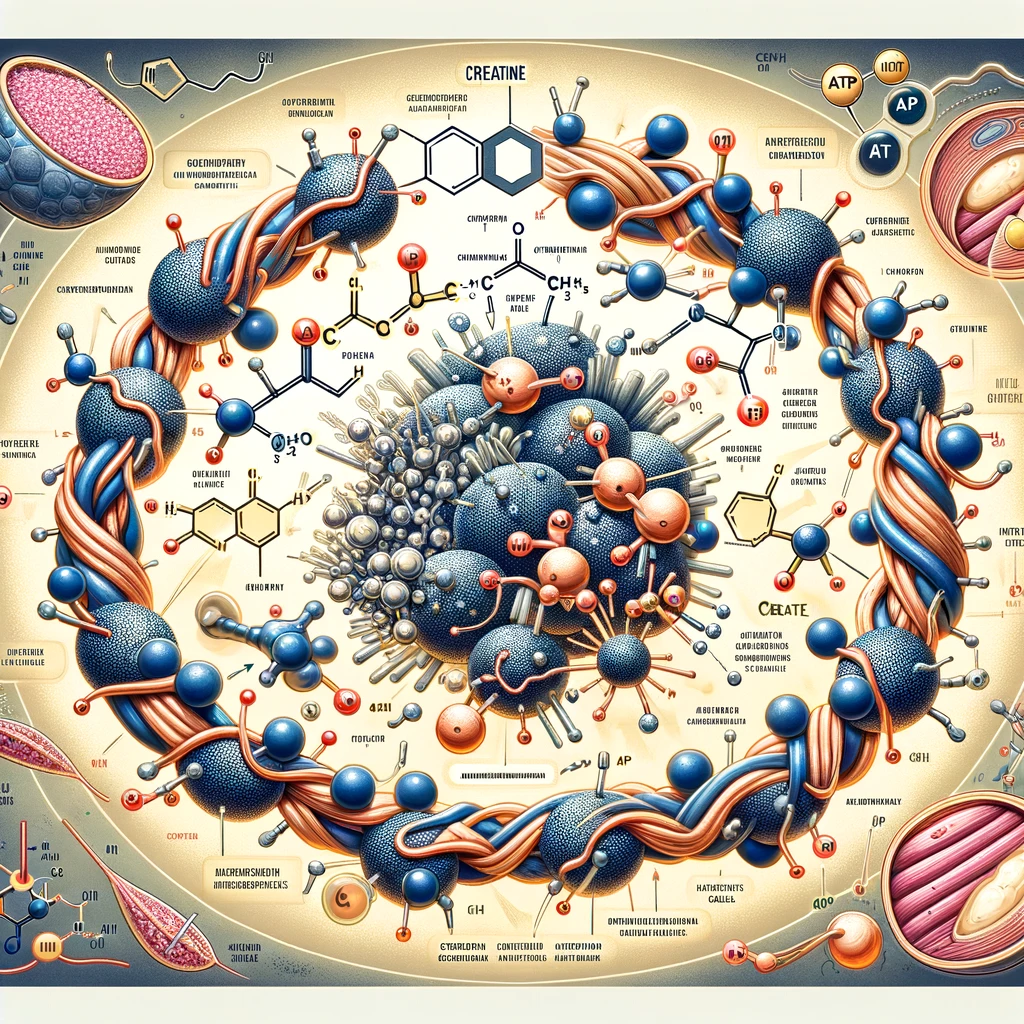
Here’s an overview of how creatine works:
- It is stored as phosphocreatine in muscles and the brain.
- During intense exercise, phosphocreatine releases energy rapidly by donating a phosphate molecule to ADP to form ATP (adenosine triphosphate)
- ATP provides immediate energy to muscle cells, allowing you to lift heavier weights, sprint faster, jump higher, etc.
- Creatine helps regenerate ATP energy stores, enabling you to continue high-intensity activity for longer.
Supplementing with creatine increases stores of phosphocreatine in your muscles. This gives you more rapid energy to fuel intense workouts and aids muscle growth.
Benefits of Creatine Supplementation
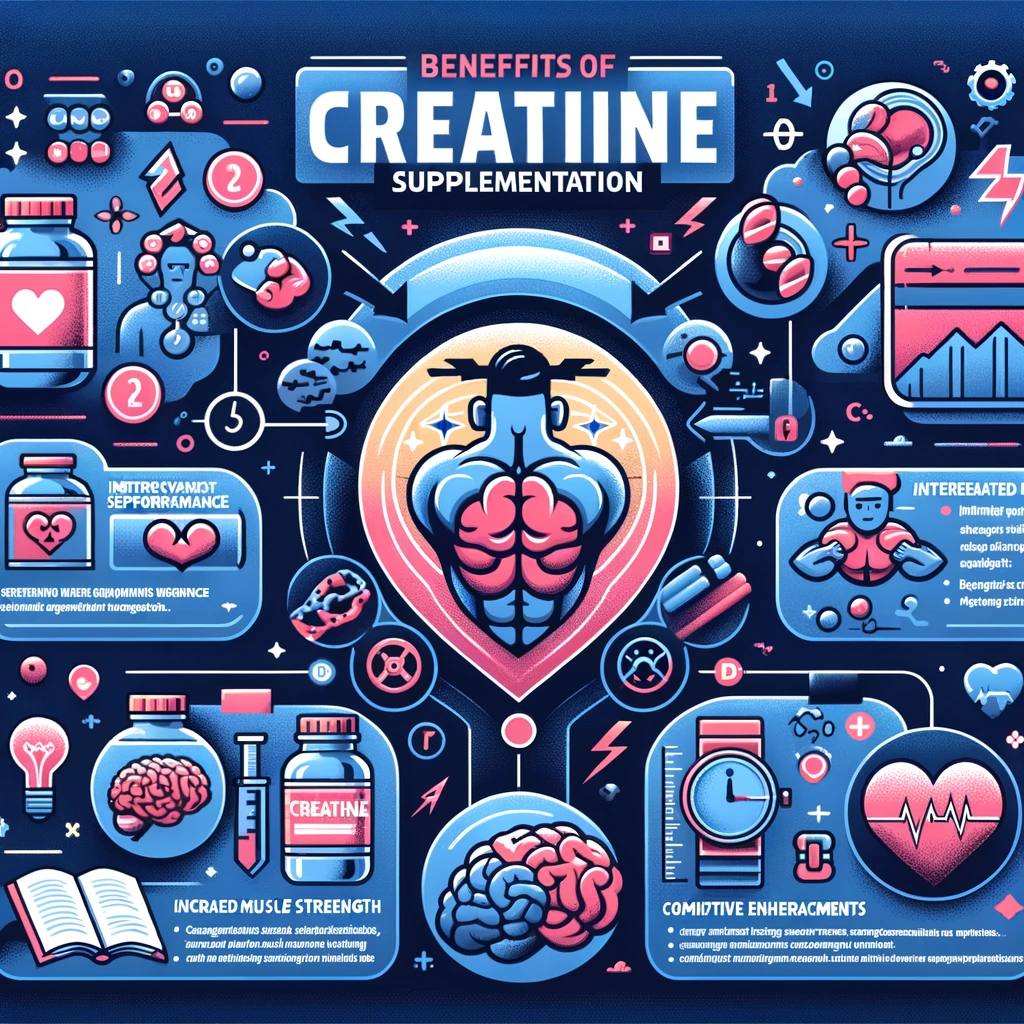
Decades of research have confirmed that creatine supplementation can:
- Improve high-intensity exercise performance: Enhanced strength, power output, and work capacity during resistance training, sprints, HIIT workouts, etc.
- Increase lean muscle mass: Greater muscle hypertrophy from strength training due to the accelerated ATP resynthesis.
- Enhance muscle recovery: Quicker regeneration between sets allows you to lift more total volume per workout.
- Reduce fatigue: Lower perception of fatigue allows you to train harder for longer durations.
- Improve brain function: Vegan creatine boosts cognition, memory, focus, and more.
Creatine is beneficial for powerlifters, bodybuilders, sprinters, team sports athletes, cross-fitters, and recreational gym-goers alike. The key is tailoring your supplementation schedule to your goals and routine.
Factors Influencing Creatine Timing
The ideal time for creatine intake can vary significantly based on:
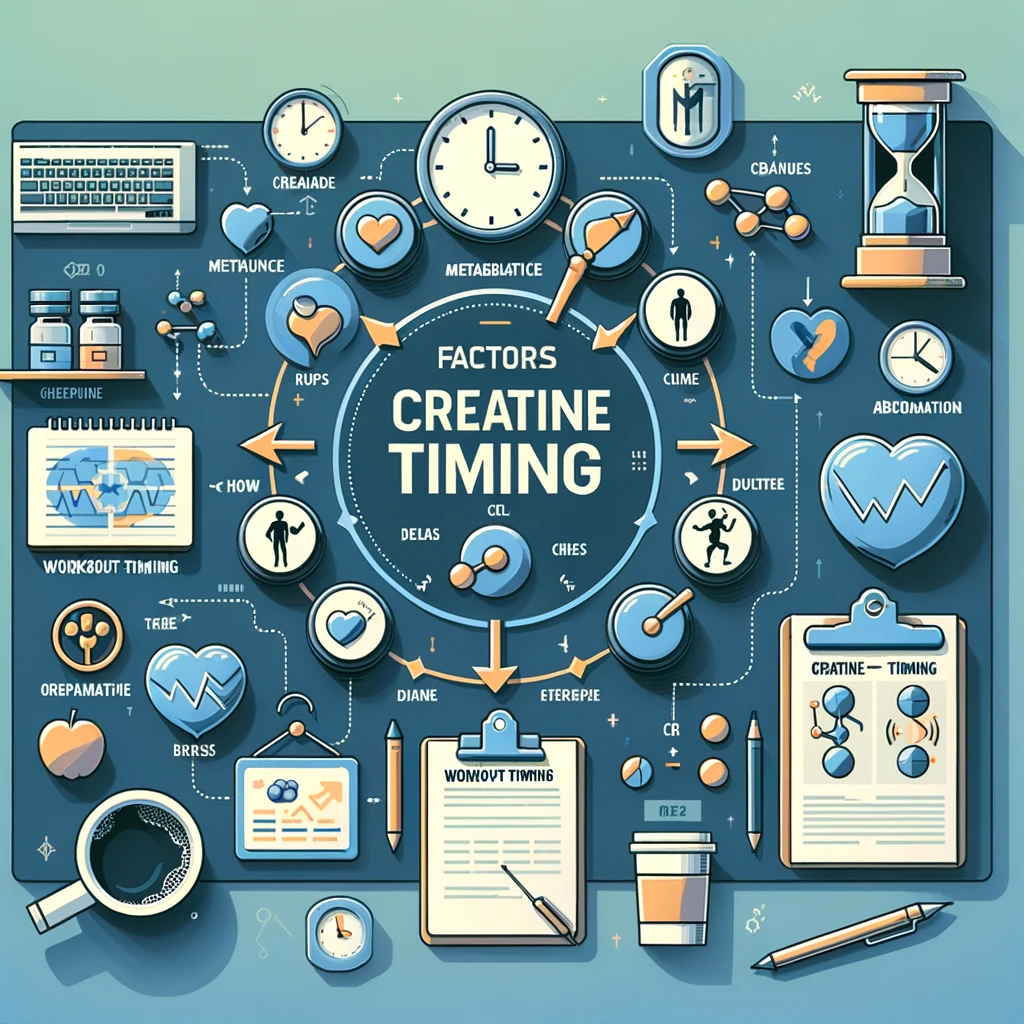
Your Individual Response
Due to differences in muscle creatine uptake and metabolism, people respond uniquely to supplementation timing:
- Some may see optimal results taking creatine in the morning.
- Others get more benefits from pre/post-workout intake.
- A smaller portion may not respond differently to timing at all.
Experimentation is key to discovering what works for you. Be patient and self-monitor regularly.
Your Workout Routine
Target your creatine schedule around your specific training:
- Morning training: Pre-workout creatine can provide energy.
- Evening training: Taking creatine earlier in the Day allows time for muscle uptake.
- HIIT or sprints: Quick energy from pre-workout creatine.
- Endurance training: Creatine improves interval training performance.
Time your dosages strategically based on your unique workout split and goals.
Meal Timing and Contents
Proper nutrient timing enhances creatine absorption:
- Take creatine alongside a high-carb meal or shake. Insulin secretion increases muscle creatine uptake.
- Protein and amino acids also boost absorption. Leucine, in particular, improves muscle retention of creatine.
- Stay adequately hydrated to help transport creatine into muscle cells.
Leverage meal timing and macros to optimize the effects of your supplementation.
The Science of Creatine Absorption and Circadian Rhythms
Understanding the science behind how your body absorbs and utilizes creatine based on timing provides key insights for optimization. Let’s break it down:
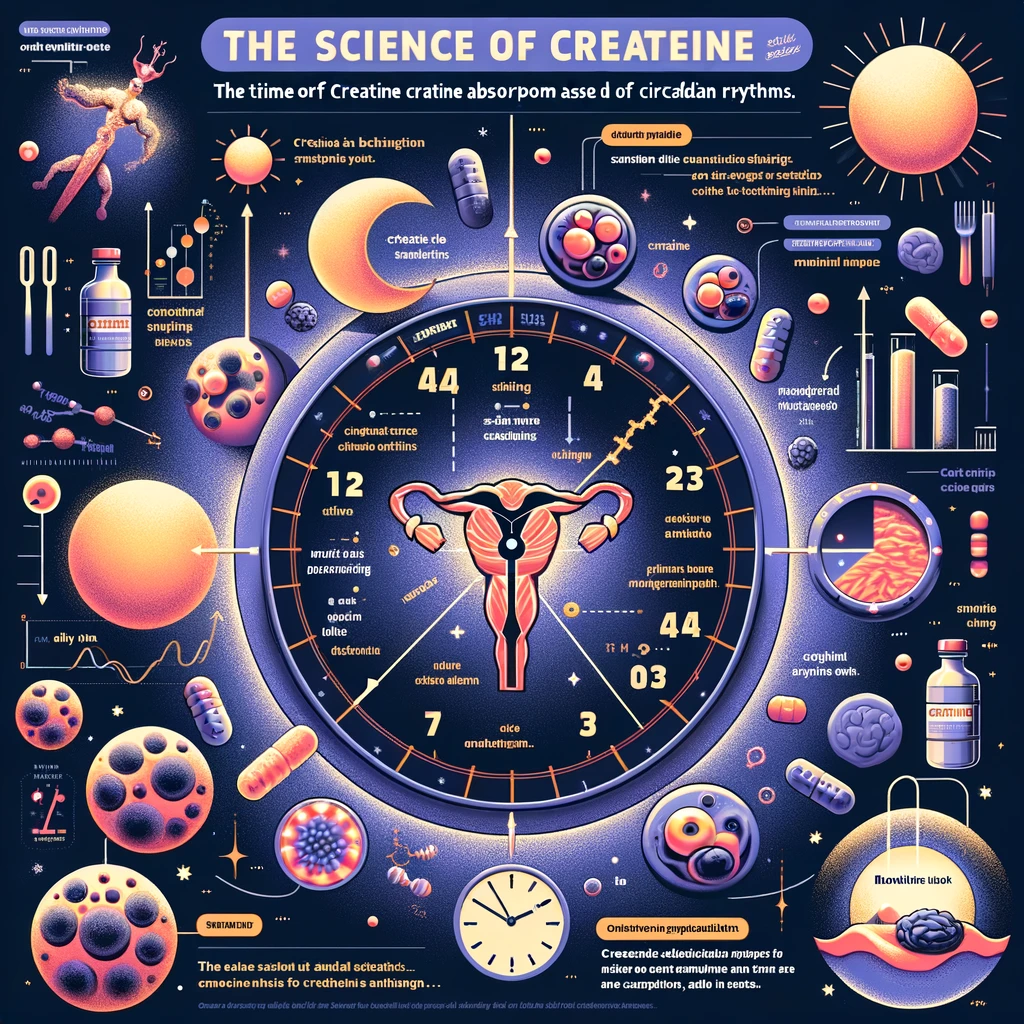
Creatine Absorption and Muscle Uptake
When you ingest creatine, here’s what happens:
- It dissolves in stomach acid and enters the small intestine for absorption into the bloodstream.
- About 60% of creatine is taken up by skeletal muscle, where it is converted to phosphocreatine – your rapid energy source.
- The remainder is excreted in urine or converted to creatinine. Only about 3-5 grams will saturate your muscle stores.
- Insulin secretion in response to carbs/protein increases muscle creatine uptake by sending extra blood supply to tissues.
- Exercise itself boosts uptake through increased blood flow, muscle cell permeability, and insulin sensitivity.
Timing creatine around workouts and meals enhances how much reaches your muscles for energy production and growth.
The Role of Circadian Rhythms
Your body follows natural circadian cycles that regulate physiological processes based on the time of Day.
Emerging research shows that creatine metabolism follows circadian patterns:
- Muscle uptake of creatine may be superior in the morning vs evening due to natural fluctuations in insulin sensitivity and anabolic hormones.
- The body may utilize and retain more creatine when consumed earlier in the Day.
- However, responses can vary individually based on chronotype (morning/evening person).
Aligning creatine intake with your circadian rhythm may optimize results, but personal trial-and-error is necessary.
Morning vs Evening: Best time Of Day to take creatine
Based on your workout schedule and individual response, you may find benefits from creatine supplementation in the morning, evening, or both.
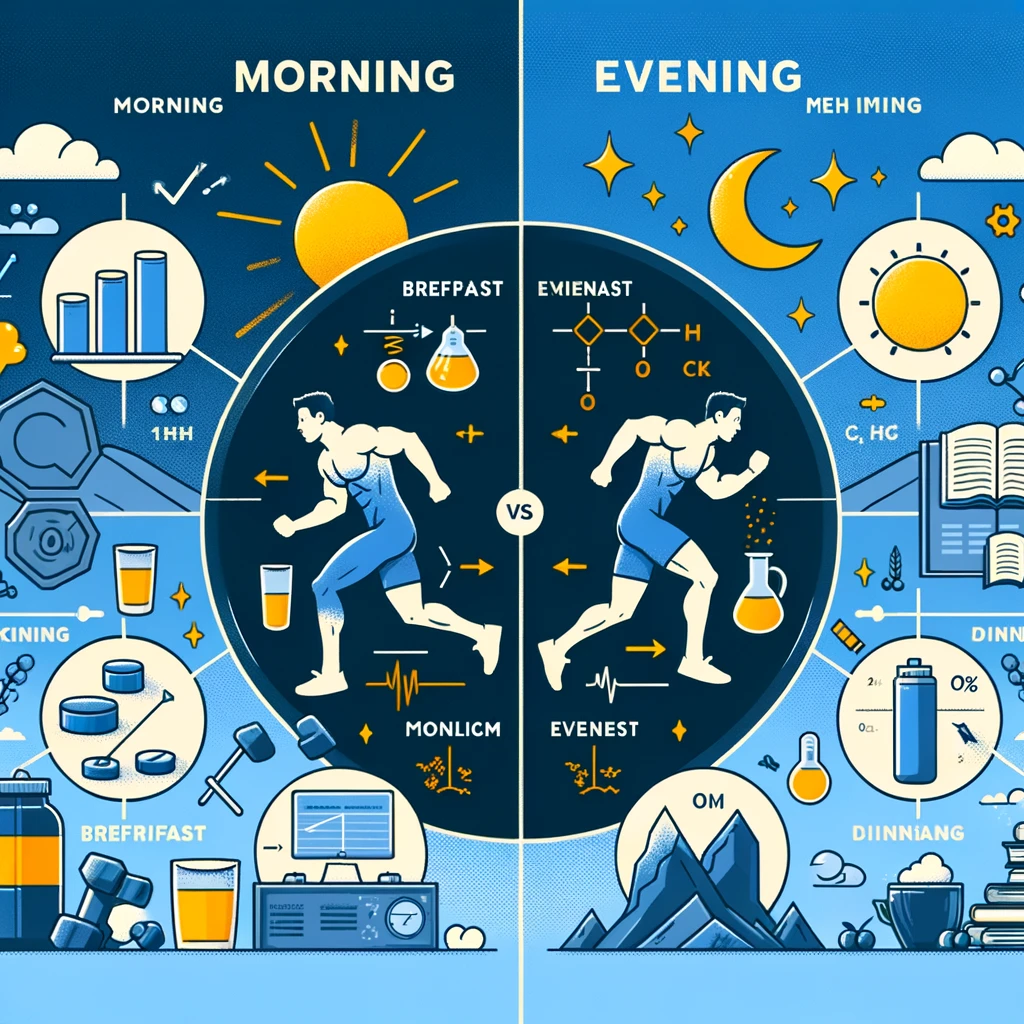
Morning Creatine Supplementation
There are several advantages to taking creatine in the morning:
- Aligns with natural circadian rhythm for potentially enhanced muscle creatine uptake and utilization.
- Boosts energy levels for early morning workouts.
- Allows time for muscles to saturate before training later in the Day.
However, possible disadvantages include:
- Stomach discomfort when taken without food by some individuals.
- Not ideal if you train many hours later in the Day.
If you work out early in the Day, take 3-5 grams of creatine with breakfast or your pre-workout meal. This gives it time to enter your bloodstream and muscles to provide energy during your session.
Stay hydrated and combine it with carbs/protein to further boost absorption.
Evening Creatine Supplementation
Evening creatine supplementation also offers unique benefits:
- Allows creatine to saturate muscles overnight, ready for the next morning’s workout.
- May cause less initial digestive distress when taken with dinner.
- It provides a creatine boost before rest for muscle building overnight.
Potential drawbacks include:
- Missing synergistic effects of pre/post-workout intake timing windows.
- Possible disruption of sleep cycles in sensitive individuals.
For those training in the evenings, take 3-5 grams of creatine with dinner or your post-workout meal. Absorption will be enhanced by insulin from carbs/protein consumed.
This saturates your muscles and provides creatine to aid overnight muscle protein synthesis after training.
Pre-Workout vs Post-Workout Creatine Timing
Strategically dosing creatine around your workouts – either before or after – can produce optimal benefits.
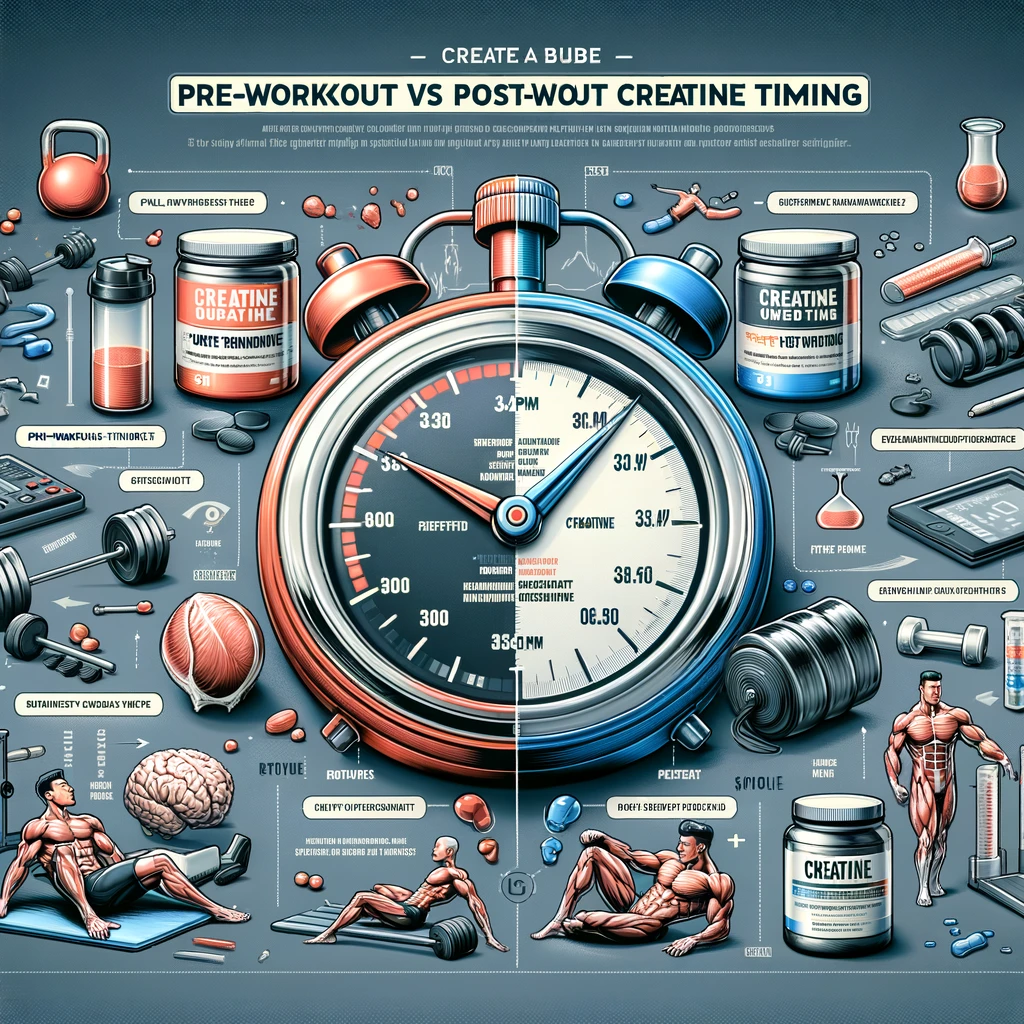
Pre-Workout Creatine
Taking creatine before your workout has several advantages:
- Boosts phosphocreatine stores for extra energy to lift more weight and train harder.
- Increased power output for more intensity on exercises like squats, deadlifts, sprints, etc.
- Enhanced intra-workout endurance, allowing you to complete more total reps.
- Decreased perceived exertion and fatigue during training.
To leverage these benefits, ingest 3-5 grams of creatine with your pre-workout meal 60-90 minutes before hitting the gym. This allows sufficient time for absorption.
Post-Workout Creatine
Consuming creatine immediately after exercise also has unique benefits:
- Rapidly replenishes depleted phosphocreatine stores post-workout.
- Significantly increases muscle protein synthesis after training.
- Enhances recovery by restoring intramuscular creatine levels.
- Allows muscles to uptake creatine when insulin sensitivity is heightened after workouts.
For optimal results, take 3-5 grams of creatine with your post-workout meal or shake. The combination of creatine plus whey protein stimulates muscle protein synthesis to greater levels than either supplement alone.
Additionally, consuming creatine with carbs enhances the insulin response for superior creatine uptake. Make sure to stay well hydrated post-training to allow efficient creatine transport.
Creatine Timing on Rest Days
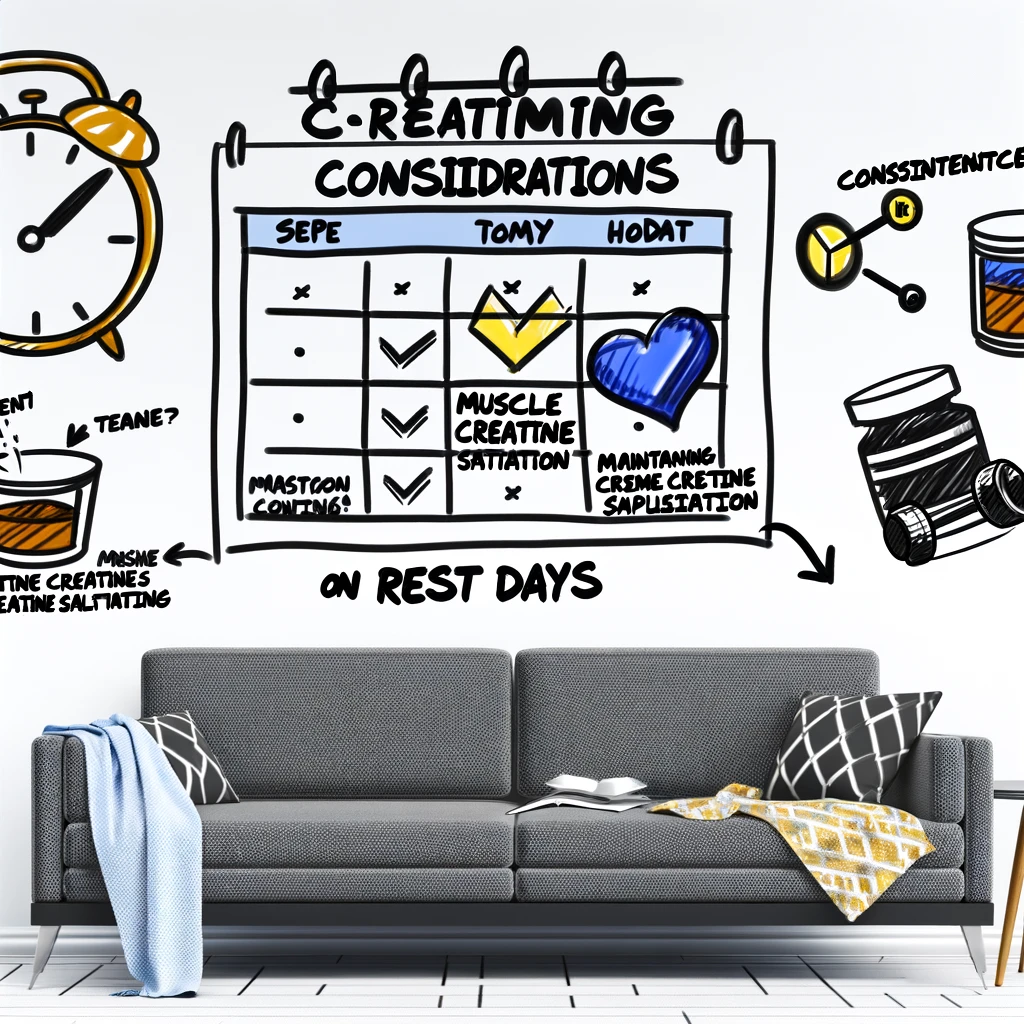
Creatine can still play an important role even when you aren’t training. Here are recommendations for rest day supplementation:
- Continue taking 3-5 grams of creatine on rest days to maintain saturated muscle creatine levels.
- If loading, take the exact dosage as training days and reduce once saturation is achieved.
- Prevent excess creatine conversion to creatinine by limiting dosage based on your body weight and goals.
- Increase water intake on rest days to aid continued creatine uptake.
- Take creatine alongside carb and protein-based meals to capitalize on the insulin response.
- Monitor kidney function if supplementing creatine continuously for months without a break.
Proper rest is crucial for recovery. Creatine supports this process by keeping your muscles energized and primed for your next session.
Combining Creatine With Other Supplements
Certain supplements stack synergistically with creatine for enhanced benefits:
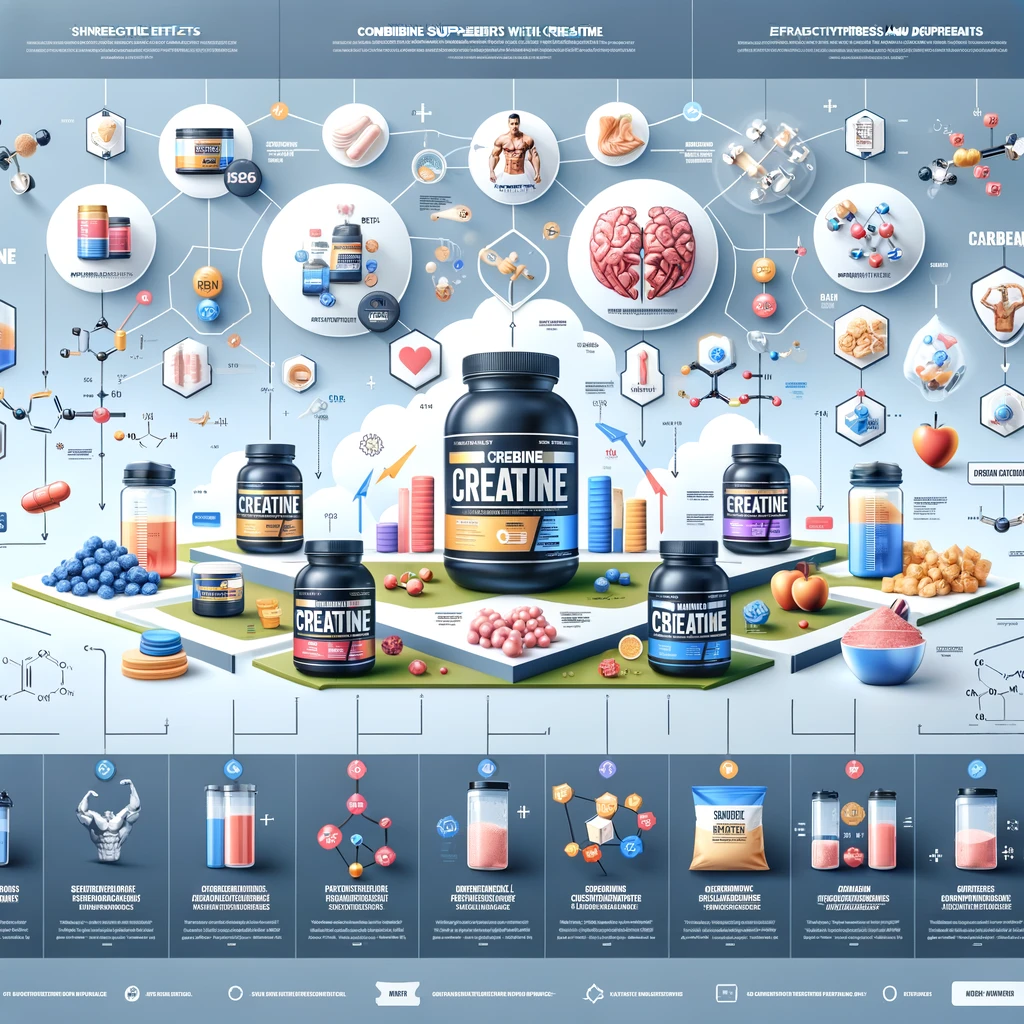
Creatine and Protein
Consuming creatine and protein together has been shown to further increase muscle mass and strength gains compared to either alone.
Whey protein contains amino acids like leucine that boost creatine uptake by muscles, while creatine accelerates protein synthesis.
For best results:
- Take 5 grams of creatine with 20-40 grams of whey protein post-workout.
- Alternatively, add creatine to your protein shake on both workout and non-workout days.
Creatine and Caffeine
Many take creatine with caffeine pre-workout for energy. However, caffeine slightly decreases creatine uptake.
If stacking, limit caffeine to 200-300mg (2-3 cups of coffee equivalent) to avoid major absorption interference.
Take caffeine 30-60 minutes before creatine to allow it to clear your system. This will still provide the ergogenic effects while optimizing creatine effects.
Personalized Creatine Timing Strategies
While research provides general guidelines, optimizing your creatine schedule requires an individualized approach. Here are tips:
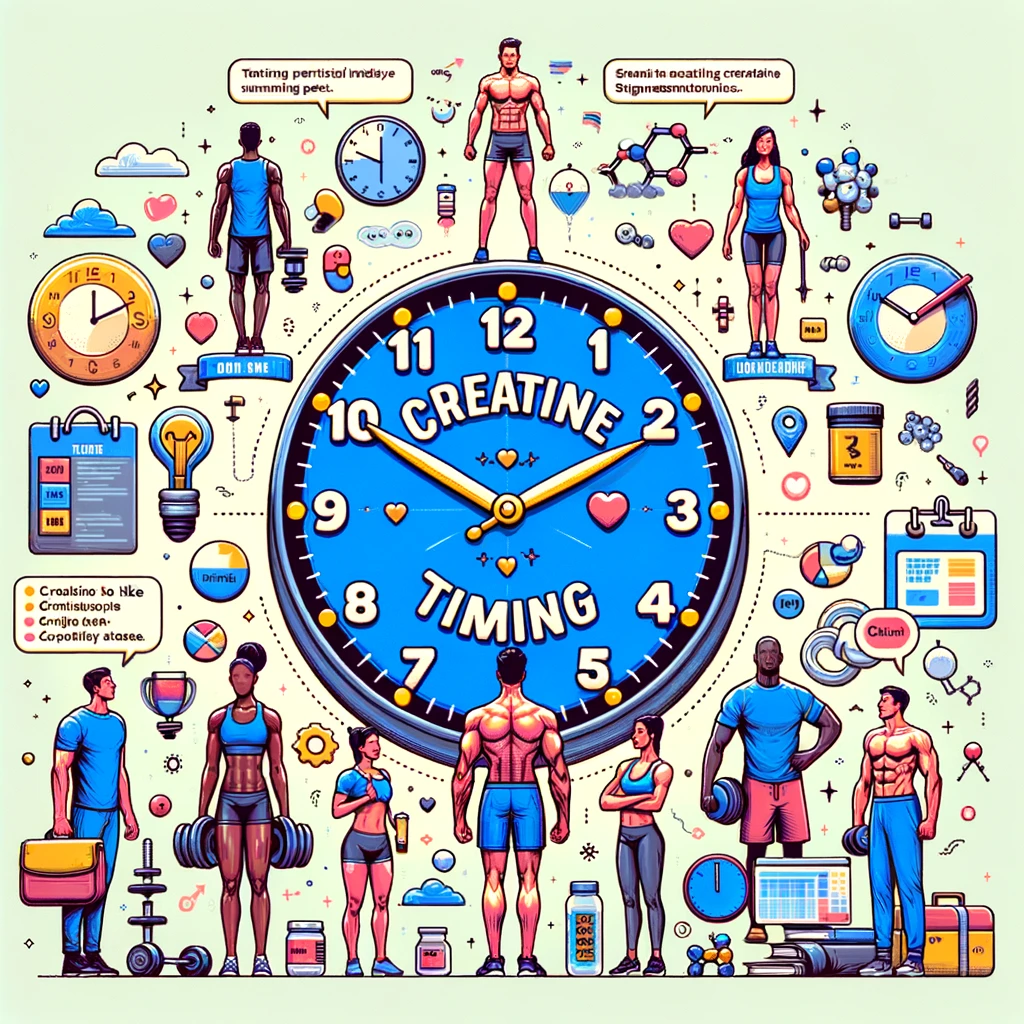
Carefully Monitor Your Body’s Response
Pay close attention to how you feel and perform when supplementing creatine at different times. Track metrics like:
- Exercise performance: Strength, endurance, power, etc.
- Workout recovery: Muscle soreness, ability to train consistently.
- Muscle gain: Measurements, progress photos, etc.
- Side effects: Digestive issues, sleep disturbances, etc.
Adjust your timing as needed based on your response. Be consistent for at least 4-6 weeks to properly assess results.
Consult a Qualified Fitness Professional
Consider working with a sports dietitian, nutritionist, or trainer to optimize your creatine strategy. They can:
- Tailor dosage and timing based on your goals, routine, chronotype, etc.
- Ensure your diet supports maximizing creatine effects.
- Provide expert guidance on how to monitor and assess your progress.
An experienced professional can help fast-track your journey to discovering your ideal creatine schedule.
Conclusion
Creatine has compelling evidence supporting its effectiveness. But proper timing is key to harnessing its full potential for improving exercise performance, building muscle, and supporting your overall fitness goals.
There is no universally optimal creatine schedule. By understanding the science, tracking your body’s response, and making personalized adjustments, you can discover the ideal timing strategy.
Be patient, experiment intelligently, and work with a professional if needed. With consistency, you’ll find the creatine timing sweet spot to take your training to new heights!
faqs
Can I take creatine at any time of day?
Yes, you can take creatine at any time of day. However, the optimal timing may vary depending on your individual preferences and workout schedule. Consider your circadian rhythms, exercise routine, and personal response to creatine when deciding the best time for you.
Is it necessary to cycle creatine or take breaks from supplementation?
No, cycling creatine or taking breaks is not necessary. Creatine is safe for long-term use, and consistent supplementation can provide ongoing benefits. However, some individuals choose to cycle it for personal reasons, but it’s not a requirement.
Should I take creatine on rest days?
Taking creatine on rest days is not mandatory, but it can still be beneficial. Creatine can help maintain your muscle creatine stores even on days when you’re not working out. You can adjust the dosage to match your activity level on rest days.
Can I combine creatine with other supplements like protein or caffeine?
Yes, creatine can be combined with other supplements like protein or caffeine. Creatine and protein can work synergistically to support muscle growth and recovery. When combining creatine with caffeine, consider timing to minimize potential interactions.
How do I know if my creatine timing is working for me?
Monitoring your body’s response is essential. Track your workout performance, muscle gains, and overall energy levels. If you see positive changes and meet your fitness goals, your timing is likely effective. If not, consider adjusting your timing or seeking professional guidance.
When should I consult a fitness professional regarding my creatine timing?
You should consider consulting a fitness professional if you’re experiencing difficulties optimizing your creatine timing, have specific fitness goals, or if you’re unsure about your supplementation strategy. They can provide personalized guidance based on your unique needs.
Are there any side effects of creatine supplementation related to timing?
The timing of creatine supplementation itself rarely causes side effects. However, some individuals may experience digestive discomfort or cramping if taken on an empty stomach. To minimize this, consider taking creatine with food or splitting the dosage.
Is there an age limit for creatine supplementation?
Creatine is generally safe for adults of all ages. However, if you have any underlying medical conditions or concerns, it’s advisable to consult with a healthcare professional before starting any supplementation regimen.
Can I take creatine with medications?
A9: If you’re taking any medications, it’s essential to consult with your healthcare provider before adding creatine to your regimen. Some medications may interact with creatine, so professional guidance is crucial.
Are there any specific creatine products recommended for timing purposes?
There are various forms of creatine available, including creatine monohydrate, creatine ethyl ester, and more. Creatine monohydrate is the most widely studied and recommended form. The choice of product should be based on personal preference and tolerance.
